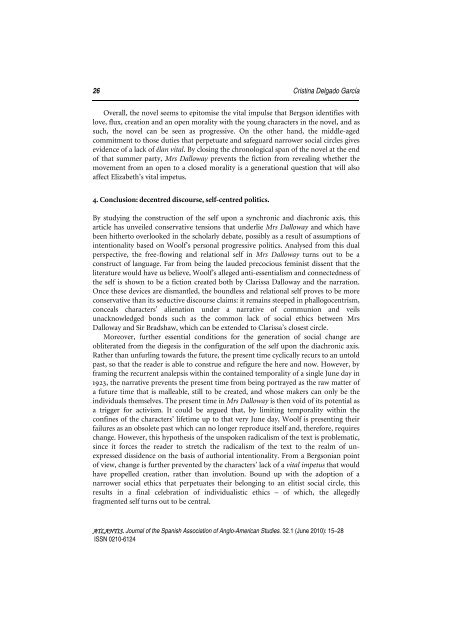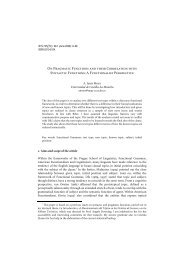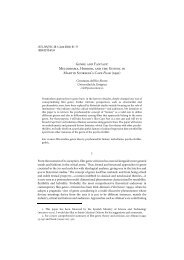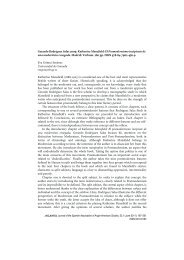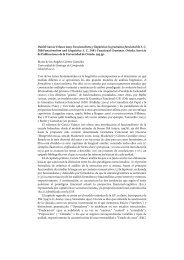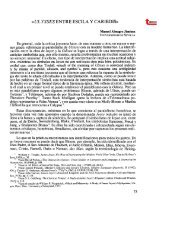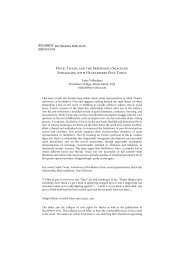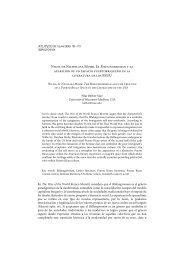Revista de la Asociación Española de Estudios Anglo - Atlantis
Revista de la Asociación Española de Estudios Anglo - Atlantis
Revista de la Asociación Española de Estudios Anglo - Atlantis
Create successful ePaper yourself
Turn your PDF publications into a flip-book with our unique Google optimized e-Paper software.
26 Cristina Delgado García<br />
Overall, the novel seems to epitomise the vital impulse that Bergson i<strong>de</strong>ntifies with<br />
love, flux, creation and an open morality with the young characters in the novel, and as<br />
such, the novel can be seen as progressive. On the other hand, the middle-aged<br />
commitment to those duties that perpetuate and safeguard narrower social circles gives<br />
evi<strong>de</strong>nce of a <strong>la</strong>ck of é<strong>la</strong>n vital. By closing the chronological span of the novel at the end<br />
of that summer party, Mrs Dalloway prevents the fiction from revealing whether the<br />
movement from an open to a closed morality is a generational question that will also<br />
affect Elizabeth’s vital impetus.<br />
4. Conclusion: <strong>de</strong>centred discourse, self-centred politics.<br />
By studying the construction of the self upon a synchronic and diachronic axis, this<br />
article has unveiled conservative tensions that un<strong>de</strong>rlie Mrs Dalloway and which have<br />
been hitherto overlooked in the scho<strong>la</strong>rly <strong>de</strong>bate, possibly as a result of assumptions of<br />
intentionality based on Woolf’s personal progressive politics. Analysed from this dual<br />
perspective, the free-flowing and re<strong>la</strong>tional self in Mrs Dalloway turns out to be a<br />
construct of <strong>la</strong>nguage. Far from being the <strong>la</strong>u<strong>de</strong>d precocious feminist dissent that the<br />
literature would have us believe, Woolf’s alleged anti-essentialism and connectedness of<br />
the self is shown to be a fiction created both by C<strong>la</strong>rissa Dalloway and the narration.<br />
Once these <strong>de</strong>vices are dismantled, the boundless and re<strong>la</strong>tional self proves to be more<br />
conservative than its seductive discourse c<strong>la</strong>ims: it remains steeped in phallogocentrism,<br />
conceals characters’ alienation un<strong>de</strong>r a narrative of communion and veils<br />
unacknowledged bonds such as the common <strong>la</strong>ck of social ethics between Mrs<br />
Dalloway and Sir Bradshaw, which can be exten<strong>de</strong>d to C<strong>la</strong>rissa’s closest circle.<br />
Moreover, further essential conditions for the generation of social change are<br />
obliterated from the diegesis in the configuration of the self upon the diachronic axis.<br />
Rather than unfurling towards the future, the present time cyclically recurs to an untold<br />
past, so that the rea<strong>de</strong>r is able to construe and refigure the here and now. However, by<br />
framing the recurrent analepsis within the contained temporality of a single June day in<br />
1923, the narrative prevents the present time from being portrayed as the raw matter of<br />
a future time that is malleable, still to be created, and whose makers can only be the<br />
individuals themselves. The present time in Mrs Dalloway is then void of its potential as<br />
a trigger for activism. It could be argued that, by limiting temporality within the<br />
confines of the characters’ lifetime up to that very June day, Woolf is presenting their<br />
failures as an obsolete past which can no longer reproduce itself and, therefore, requires<br />
change. However, this hypothesis of the unspoken radicalism of the text is problematic,<br />
since it forces the rea<strong>de</strong>r to stretch the radicalism of the text to the realm of unexpressed<br />
dissi<strong>de</strong>nce on the basis of authorial intentionality. From a Bergsonian point<br />
of view, change is further prevented by the characters’ <strong>la</strong>ck of a vital impetus that would<br />
have propelled creation, rather than involution. Bound up with the adoption of a<br />
narrower social ethics that perpetuates their belonging to an elitist social circle, this<br />
results in a final celebration of individualistic ethics – of which, the allegedly<br />
fragmented self turns out to be central.<br />
ATLANTIS. Journal of the Spanish Association of <strong>Anglo</strong>-American Studies. 32.1 (June 2010): 15–28<br />
ISSN 0210-6124


